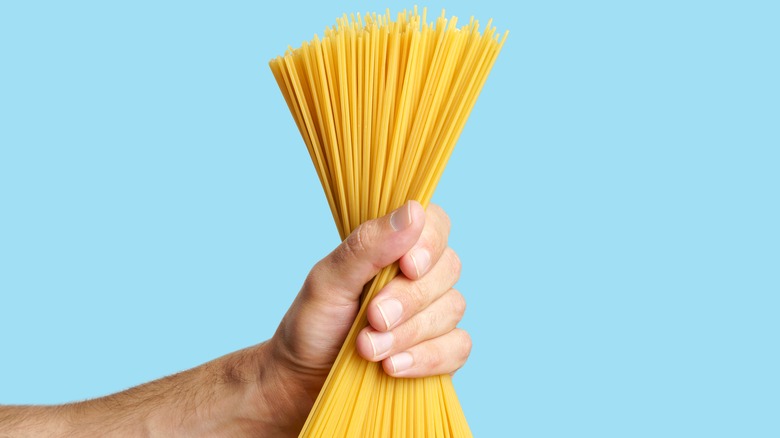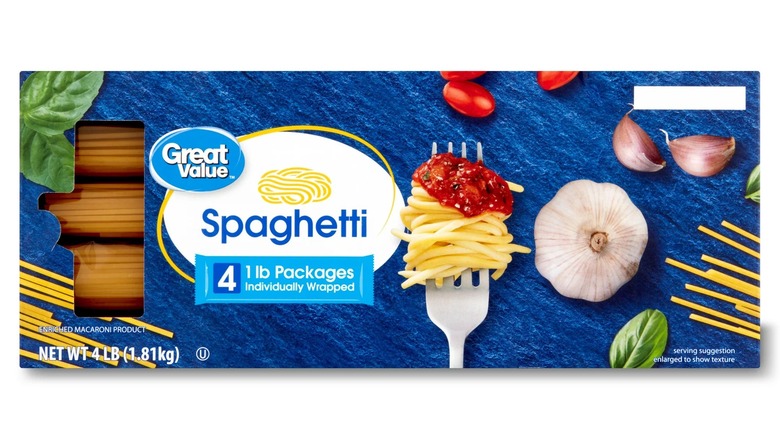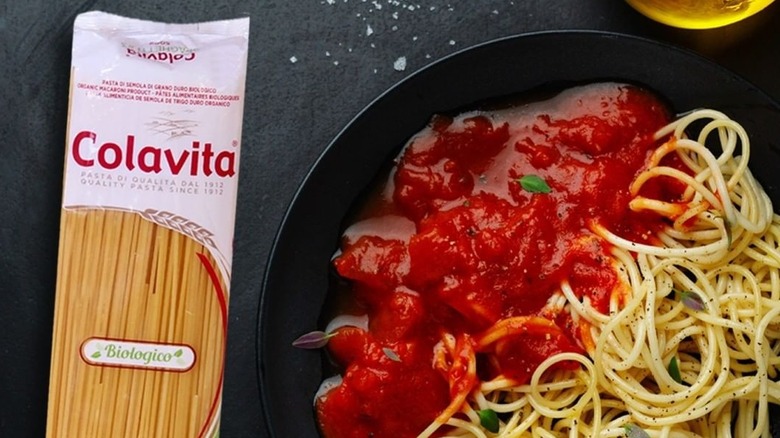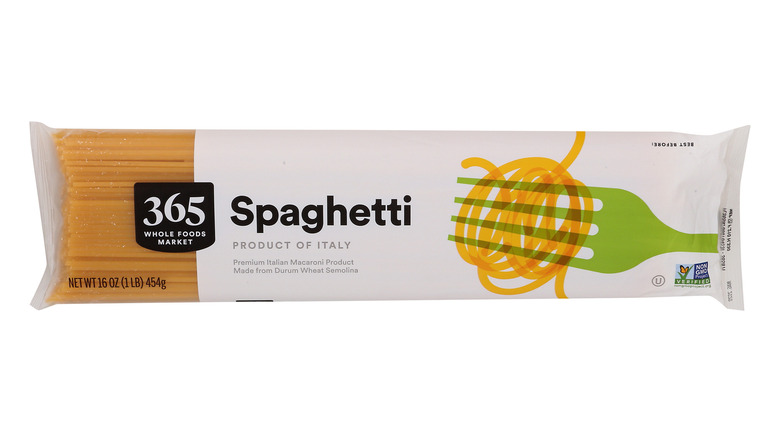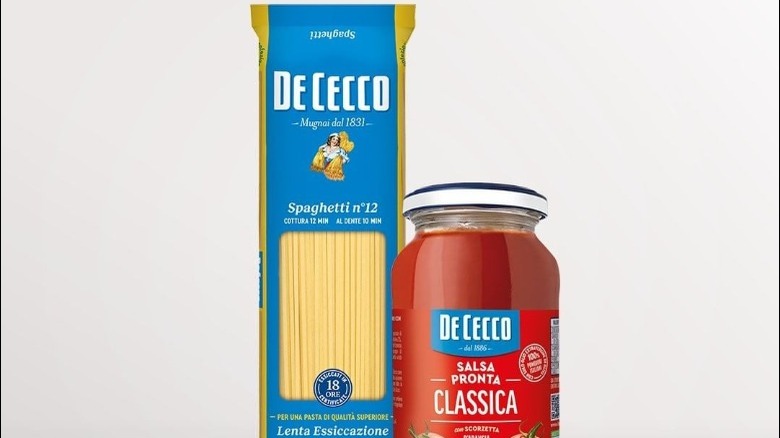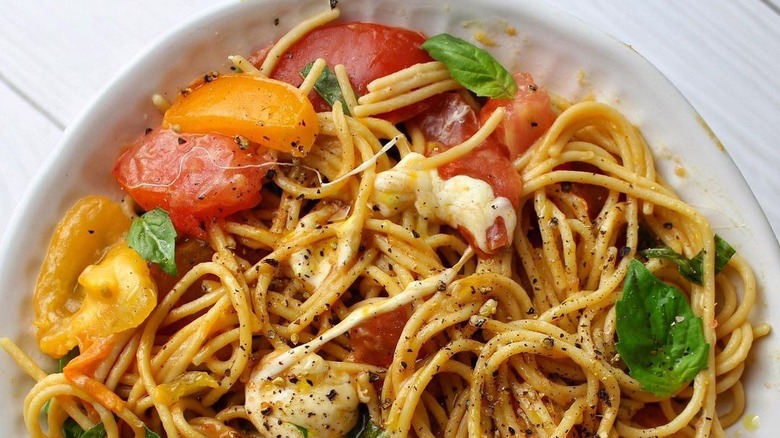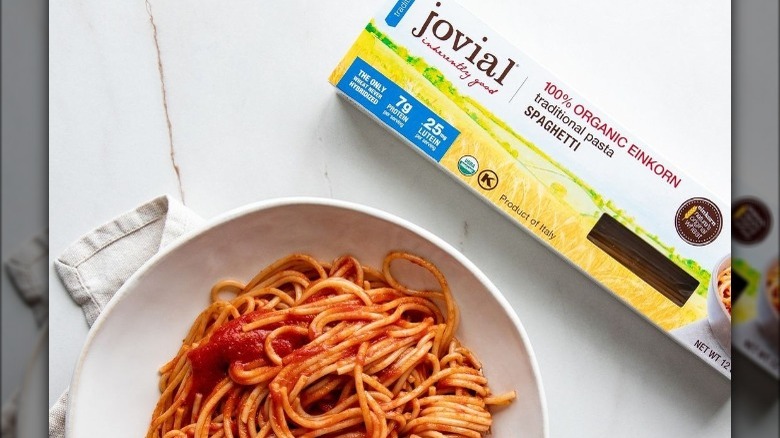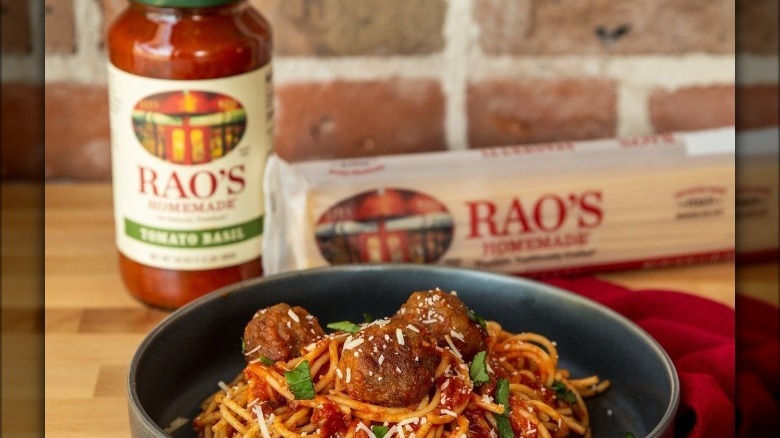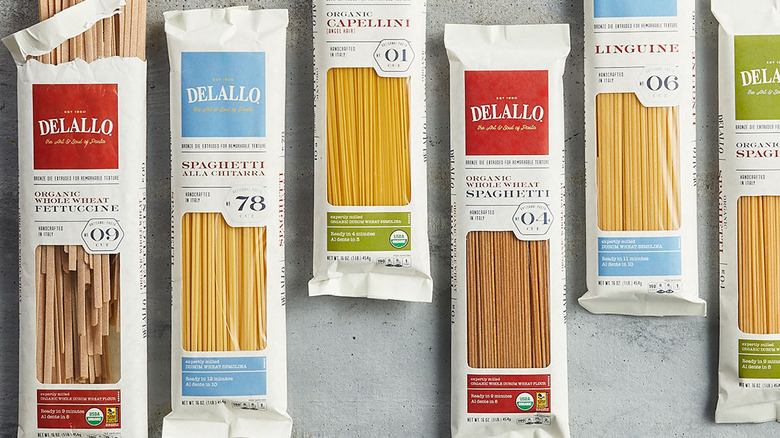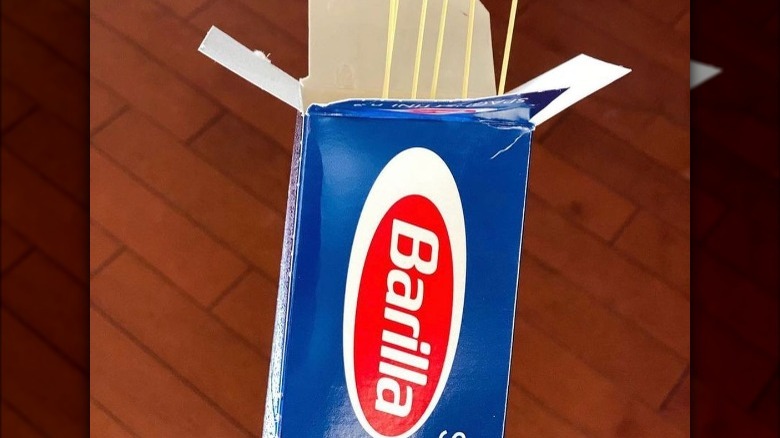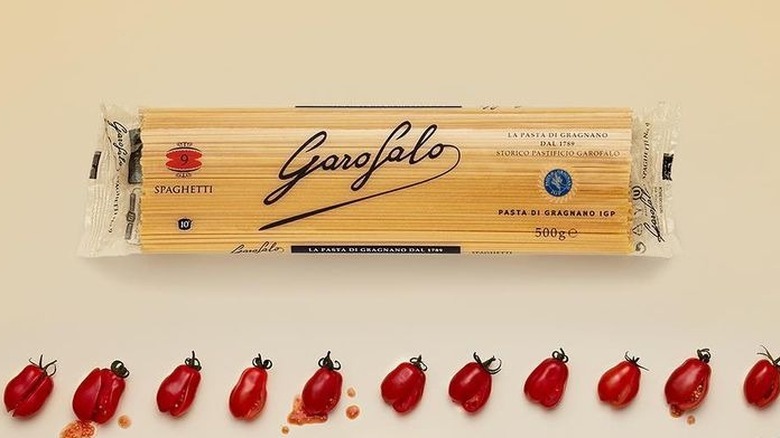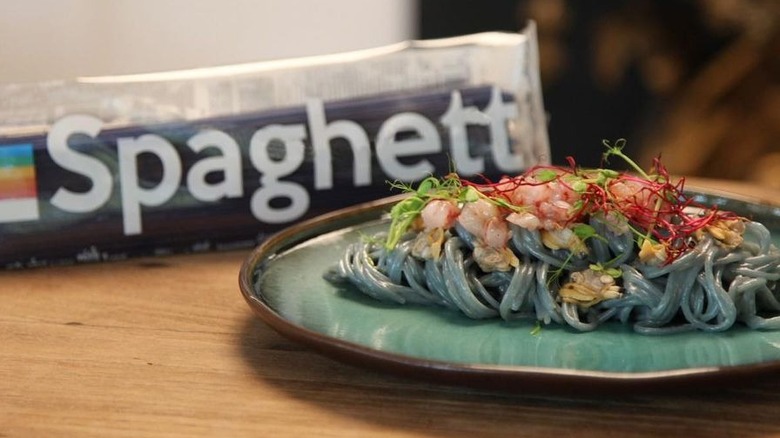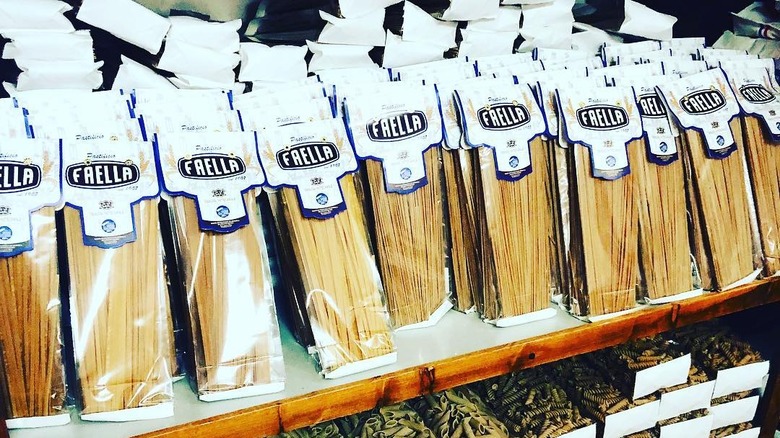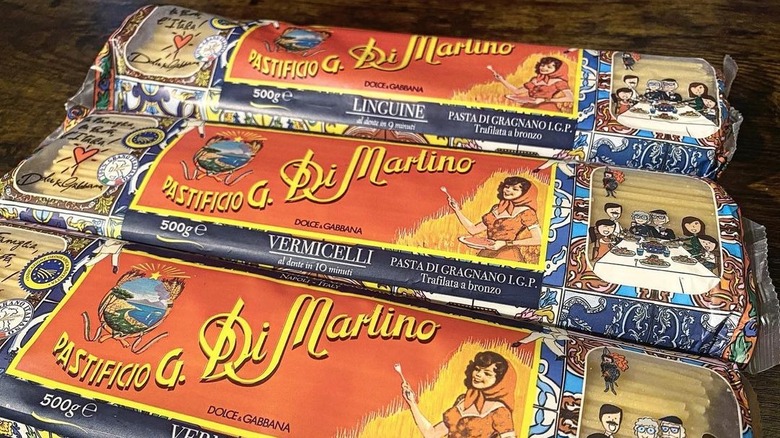13 Boxed Spaghetti Noodle Brands, Ranked Worst To Best
Even if you prefer the taste and texture of fresh pasta over box spaghetti, you might be under the impression that the two types of pasta are largely interchangeable from a culinary point of view. However, there is a difference between fresh and dry pasta. While flour, salt, and water are used to make both types of pasta, eggs are needed to make fresh pasta.
Because of this, fresh pasta is not shelf stable. It's also more delicate than dry pasta. As such, you should opt for boxed pasta when cooking heartier sauces, while fresh pasta is best for thinner sauces. And when the price of eggs goes through the roof, you can sleep at night knowing it won't affect the price of boxed spaghetti.
With that out of the way, let's run down the best boxed spaghetti brands to pair with your next batch of hearty Sunday gravy. Some of these brands are tried and true Italian-American classics, while others are from the old country. We've also considered spaghetti made without wheat for our gluten-free readers.
13. Great Value
According to the Private Label Manufacturers Association, 20 percent of grocery products sold in America are store-brand products. On top of that, a survey published in 2022 found that store-brand groceries are more popular than ever. This should come as much of a surprise. For many people, store-brand boxed pasta is a go-to cheap meal and Walmart's Great Value brand is made by established, name-brand pasta makers. While it's more affordable than name-brand pasta, Great Value spaghetti should be thought of as more of a vessel made to ship a dish's main ingredients. If you make a killer Sunday sauce, Great Value spaghetti is good enough to put underneath it. However, the taste is pretty bland and forgettable.
You can also sleep confidently knowing the price of this spaghetti isn't going up any time soon. In the face of economic uncertainty, Walmart has been aiming to keep its Great Value products affordable. The retail giant is pushing back against high prices and warning suppliers that it would be promoting its Great Value brand over its name-brand products if price increases didn't slow down. The pushback came after many suppliers reported much higher earnings levels despite selling fewer products.
12. Colavita
The story of Colavita is one of slow, trans-Atlantic growth. The company started as an olive oil producer in the 1930s, in the small Italian village of Sant'Elia a Pianisi. After decades of growth and success in Italy, the company established Colativa USA in the 1970s, becoming the first importer of extra virgin olive oil to the United States. Since then, the company has become known for all kinds of Italian grocery items, including boxed pasta.
Colavita spaghetti does have a mild umami flavor from its semolina wheat. While the integrity of the noodles can stand up to hearty sauces, any pasta flavor is easily overwhelmed by even the mildest of spices. This spaghetti is a useful budget option for a weeknight dinner, but it's not going to impress your dinner guests anytime soon. When cooking Colavita spaghetti, don't feel the need to strictly follow the cooking time listed on the box of pasta. Cook times given on pasta boxes are more of a suggestion than a rigid guideline. Rather than blindly sticking to the cooking time, taste the pasta as it cooks. If it sticks to your teeth when you chew it, your pasta still needs a bit more time. If it completely disintegrates when bitten, you've overcooked it.
11. Whole Foods 365 Everyday Value
After being tarred with the nickname "Whole Paycheck" for being too expensive, Whole Foods took steps to lower the average grocery bill at its stores and one of those steps has been elevating its in-house 365 Everyday Value brand. In 2020, the private label got a brand refresh and in 2021, nearly 300 new products were added, bringing the total to 2,200 private label products.
Because it's so affordable compared to many of the products around it, the store-brand spaghetti at Whole Foods is a great way to bring down the cost of a pasta dish made with any of the premium ingredients that can be found in the store. That said, this store-brand pasta is pretty indistinguishable compared to other store brands. If you want a more flavorful pasta, there are much better brands of spaghetti at Whole Foods that don't cost too much more.
Another great thing about Whole Foods is that the store is regularly tinkering with its offerings, often to jump on the latest food trend. In a recent blog post, Whole Foods announced the food trends it expects to see in 2023, and the post cited produce-based pasta as a major trend we should expect. It remains to be seen if the store's 365 Everyday Value pasta will jump on the bandwagon.
10. De Cecco
When it comes to making boxed spaghetti, the drying process for pasta is so important. After being extruded, pasta destined for retail sale is dried to reduce its moisture content from 31% to around 12%. The goal is to create a shelf-stable product that retains its desired shape and resists the formation of food mold.
The technique of drying pasta is also central to the story behind De Cecco. Formed in 1886, the Italian pasta company was able to bring its products to the international market thanks to a low-temperature drying device developed by founder Filippo Giovanni De Cecco. Before developing this device, De Cecco had to dry pasta in the traditional way, using the heat of the sun. The drying technique is the reason why expensive pasta tastes so much better than moderately-priced brands like De Cecco. Premium dried pasta is typically dried for more than one day, while cheaper pastas are dried with industrial warmers.
De Cecco spaghetti is good, but not quite crave-able. It's a moderately-priced workhorse pasta that harmonizes well with sauces or other toppings. It's not exactly a budget brand, but it's head and shoulders above similarly priced pasta.
9. Banza
While many of the most popular pasta brands in your local grocery store got started in Italy more than a century ago, the story behind Banza is slightly more modern. The company was founded on the idea of using flour from chickpeas to create foods that are healthier and more sustainable. Banza got a major boost in 2014 when brother-founders Scott and Brian Rudolph pitched the idea of chickpea pasta on the CNBC reality show "Restaurant Startup." After having their own pasta thrown at them by restauranteur Joe Bastianich, the brothers eventually received $75,000 in startup money from him.
Bastianich was likely convinced by positive responses to Banza pasta from diners on the show, but does Banza spaghetti stack up well against traditional wheat-based pasta? Well, that depends. There's no getting around the distinct chickpea flavor of this spaghetti, but that isn't a criticism. In fact, we think Banza spaghetti can be a better option than traditional pasta in dishes that feature bold Mediterranean flavors like lemon, olives, and oregano. Bottom line: Banza has a bold flavor for pasta and it needs bold flavors to match. If you're looking to make more traditional Italian or Italian-American dishes, though, you might be better off looking elsewhere.
8. Jovial
Jovial spaghetti is distinctive for being made with einkorn, an ancient grain that's been called the oldest wheat known to scientists. Similar to ancient grains like spelt, einkorn has never been hybridized. As a result, it has fewer chromosomes, including the gluten-related chromosome that is responsible for creating adverse reactions in people with celiac disease. Flour made from einkorn has become increasingly popular and it's considered a healthier alternative to all-purpose wheat flour because it contains more nutrients.
Jovial spaghetti resembles pasta made with wheat flour in terms of appearance and bite. The taste is robust and vaguely reminiscent of barley. It reminded us of smelling malted barley as we walk into our favorite local brewery. Therefore, it's best when used with other strong flavors. Jovial spaghetti is even more impressive when compared to other gluten-free pasta, which tends to lack integrity. Reheating leftovers can cause gluten-free pasta to fall apart completely. Not only does Jovial stand up to reheating, but it also has the structure needed for hearty dishes and baked pastas.
Jovial's founder Carla Bartolucci sadly passed away in 2021. Bartolucci grew up in an Italian-American household and she met her husband while studying abroad in Italy. She founded Jovial to make pasta using einkorn, and today the company is a multi-million dollar business that sells a wide range of products.
7. Rao's
We don't often associate Italian-American red sauce joints with exclusivity, but it's hard to talk about Rao's without mentioning it. After opening in 1896 in East Harlem, Rao's restaurant spent decades building up a large following. Everything changed in 1977 when a New York Times food critic gave the restaurant three-star review. After that, scoring a table at Rao's was next to impossible. The restaurant parlayed its runaway success into opening new locations and marketing a line of premium Italian American grocery products.
Every type of Rao's pasta — including the spaghetti — is made with an all-semolina dough and extruded through bronze dies. The resulting noodles are finely textured, allowing them to grab and hold on to sauce much better than lesser pastas. The spaghetti and other pastas have a deep yellow color and rich taste that goes particularly well with red, tomato-based sauces. The one odd thing about this spaghetti brand is that the price of it can vary widely, often depending on where you're buying it. If you are at a bargain grocery chain, you can expect to pay a lot less for it than if you had bought the exact same spaghetti at Whole Foods.
More than 125 years after its founding, the company is still taking a high-minded approach. Rao's recently staged an immersive pop-up experience in New York City that featured the company's pastas and sauces. The event — dubbed The Saucery — also had wine pairings and an Italian-themed produce market.
6. DeLallo
DeLallo started as a purveyor of Italian foods located just outside of Pittsburgh, and the company's beginnings is about as Pennsylvania as it gets. In the early days, founder George DeLallo would load up his truck with Italian grocery products and drive around to small mining towns in order to sell his wares. Over time, DeLallo became known amongst the miners as The Salami Man.
These days, the family-owned and operated DeLallo sells a lot more than salami. Using its network of producers and distribution centers, DeLallo imports, produces, and distributes Italian and Mediterranean goods. The company says it sells authentic Italian pasta made with high-quality durum wheat and extruded through artisan bronze dies that give it a rough, porous exterior designed to capture as much sauce as possible. We found that al dente DeLallo pasta has an ideal texture and slight springiness. If you're looking for some variety, the company also makes a number of unique shapes, including radiatori and "shellbows". DeLallo spaghetti comes with a premium price tag, but it's a cut above many other brands.
5. Barilla
Founded in Italy, Barilla entered the U.S. market in 1997 and has continued to evolve as a brand over the past couple of decades. The company made a major marketing blitz in September 2022 with the unveiling of its Pasta Season Pack. This comprehensive kit featured an assortment of different Barilla pastas, cooking utensils, and easy pasta recipes. The following month, Barilla got fancy with a new premium pasta line. Dubbed Al Bronzo, the premium line of pasta comes in red packaging and is made with a different method than its established line of pasta, which comes in signature blue boxes.
Because the availability of Al Bronzo is limited, we've decided to focus on Barilla's standard line of spaghetti. Truth be told, the existing pasta line is pretty good as is, and it has a very approachable price point. The pleasing creamy taste of Barilla spaghetti can really stand on its own, and it's easily enhanced with a bit of olive oil or butter. If you want to make a simple dish like cacio e pepe — or even just buttered noodles — you could do much worse than going with Barilla.
4. Garofalo
Garofalo was founded in 1789 in the Italian town of Gragnano — the so-called cradle of the pasta industry. The combination of ideal conditions for drying pasta and flowing spring water for milling made the town an ideal location for pasta making. Over the centuries, the company grew as a manufacturer of private-label pasta and its own line of pasta that was mostly sent outside the country. Garofalo did not launch its own brand inside Italy until 2001. Rather than focusing on strict uniformity, Garofalo's pasta-making process embraces tiny imperfections with the idea that each cut of pasta is special in its own way.
We found Garofalo spaghetti to have a pleasing spring and texture. Although it isn't made using eggs, we detected a subtle egginess to the flavor of this spaghetti that would go well with butter- and cream-based sauces. That flavor comes from premium wheat selected by the company, and Garofalo actually has a tracer that allows you to see where the wheat in your package of spaghetti came from. The online tool also lets you see the results of quality tests performed on retail packages of pasta.
3. Rustichella D'Abruzzo
Rustichella D'Abruzzo was formed when the family-owned Pastificio Gaetano Sergiacomo was looking to make whole wheat pasta in the 1980s. In honor of this more rustic kind of pasta, the company dubbed the new brand: Rustichella d'Abruzzo — the rustic pasta of Abruzzo. This celebrated Italian pasta brand that makes its noodles using wheat found to have the right levels of proteins and gluten. The company also says that its pasta is dried for around two days at temperatures ranging from 30 to 40 degrees Fahrenheit. These are much cooler temperatures than those used in industrial drying, which is typically conducted at about 90 degrees Fahrenheit. The result is a pasta that's been served at both White House dinners and the dinner table of Luciano Pavarotti, according to the official website.
The spaghetti from Rustichella D'Abruzzo has the perfect texture for grabbing even the loosest of sauces. It also has a smooth, slightly toasty flavor. Rustichella D'Abruzzo Is another pasta company that specializes in making unique shapes that go far beyond spaghetti. For example, the company's shell-like cestini pasta is perfect for collecting small chunky sauce ingredients like peas and bits of ground beef.
2. Faella
Faella is one of a handful of pasta companies founded in the historic Italian town of Gragnano in the early 20th century. Despite advances in technology and greater regulation, Faella still primarily relies on a pasta-making technique the company developed more than 100 years ago. That technique results in pasta that has a particularly rough texture that's been compared to sandpaper. Smoothed out by cooking, this texture makes the spaghetti noodles particularly adept at grabbing sauce.
This is a premium spaghetti that's highly versatile. While you could pair it with a simple tomato sauce, noodles of this quality demand something a little more special. Pair Faella spaghetti with the Neapolitan classic puttanesca and allow it to grab the sauce flavored with anchovies, olives, and capers. Or, you could pair it with an Amalfi Coast classic: anchovy colatura. This fermented liquid is a byproduct of curing anchovies and it's akin to Asian fish sauces. The classic move is to pair colatura with olive oil and crushed garlic to create a bold, umami-rich sauce with incredible depth of flavor.
1. Pastificio Di Martino
Spaghetti from Pastificio de Martino is a popular choice for people looking to splurge on premium pasta. You can easily find packages that are more than ten times the cost of spaghetti from Great Value. Why so expensive? Maybe because it's associated with world-class clothing designer Dolce and Gabbana. In a 2017 collaboration, Pastaifico de Martino created hand-wrapped noodles designed to go with a kitchen apron and accessories made by the Italian designer. If you want to get your hands on these noodles, don't go to Walmart, as they are typically found in gourmet and specialty stores. You can also buy this spaghetti on Amazon.
Every bite of spaghetti from Pastificio de Martino is a bite of Italian luxury. Even though it comes in a package, the texture of the spaghetti it's pretty similar to that of fresh pasta and it's easy to get that perfect al dente texture every single time. These noodles are great on their own, so we don't recommend covering them up with bold flavors. You can easily get away with using a simple tomato sauce or even just a splash of olive oil. If you want the full baller experience, you can also buy a bottle of premium sauce from Pastifico de Martino.
